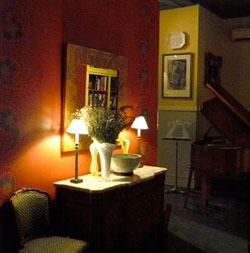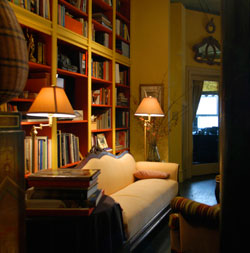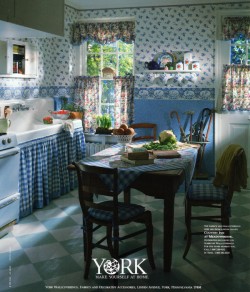I’ll use this spot to chart what I enjoy and endorse, as we attempt to live a life of style in a culture of business and writing and art.
And I hope you join me; share your own stories, insights and ideas about living a creatively expressive life.
Tuesday, November 10, 2009

Penwork mirror by June Meier and Kakia Livanos and paisley wall by Diane Meier in the foyer of MEIER, 907 Broadway.
In
The Season of Second Chances, my protagonist describes a colleague’s office as so personal, so full of intimate and residential objects as to be ‘completely inappropriate’. Through the book, I looked for ways to create contrast between these two professional women. Josie O’Sullivan, a world-renowned scholar and Amherst professor of French Literature, brings Cordon Bleu-quality lunches to her suitemates each day. Joy Harkness, our narrator, can barely manage creating a tuna sandwich, has never had a guest to dinner nor made an attempt at decorating a home, no less her office. And yet she is very clear about her belief that Josie’s office is far too domestic to house the creation of any serious work. I mean for you to wrinkle your nose.

A place to sit and read in our Edwardian Library
I hope you begin to realize that Joy is an unreliable narrator, in this as in so many other things. But I also want you to go back and try to think when, if ever, you were in an office that carried the mark of its owner to any great extent. I’m banking on the fact that you can’t easily bring one to mind. Neither can I. And I’m in the biz, so to speak.
So what’s that about? These rules that keep our talents and our personal expression separate, depending on the venue or the activity?

At
MEIER we imagined a very real customer for our client and then we imagined her kitchen with the fresh patterns of wallpaper and fabrics from York. Our work in designing the logo, as well as the ads.
Because it’s not just the line people draw between home and office, it’s the idea that with the exception of Interior Design (which carries with it the equally devastating punch that a decorator
must live in a showcase), what one does for work (window dressing, set design, art direction, prop-styling)
wouldn’t have its natural exponent in one’s real life. As though they’re surprised you didn’t “keep it all†for art or commerce.
Frankly, I don’t want to believe that there is a completely separate intellect or instinct for creating the environments of the
imaginary lives in ads, as distinct from creating environments for real live,
breathing people. And I
won’t believe that there is a reason the ‘office’ where one works, needs to be any less personal or authentically articulate about one’s life than a home. Why – when we spend the better part of our week within these walls—why would we not create an environment that expressed our lives, our loves and our values? Why not indeed?



